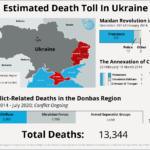Pro-EU candidate Maia Sandu won the Moldovan presidential run-off elections on November 15th with goals to end corruption, scandals, and favoritism towards the Kremlin.
Rebranding the Pro-Western Parties
Sandu secured 57.7 percent of the vote by positioning herself against both pro-Russian groups and unpopular pro-Western parties. Her anti-Russia stance revolves around Russian peacekeeping in Transnistria, which prevents Moldova from unifying with Romania or joining the EU. However, her disassociation from other pro-Western groups stems from 2016 when the U.S. government sponsored political parties connected to a corrupt banking tycoon, Vlad Plahotniuc. The U.S. formally ended their support for Plahotniuc in 2019 by refusing to grant him refuge after his inditement on corruption charges. In 2016 presidential and 2019 parliamentary elections, pro-Russian parties discouraged the Moldovan voter base from supporting the EU-platforms by publishing images of Plahotniuc’s meeting with U.S. Assistant Secretary of State Victoria J. Nuland, linking Western-backing to further corruption in Moldova. Sandu’s anti-corruption campaign and her subsequent land-slide victory signify a new image for the pro-Western movement.
Potential New Parliamentary Elections
President-elect Sandu proposed snap parliamentary elections stating, “Parliament has proven that it doesn’t work for people.” Previous Moldovan officials such as 2018 appointed President Pavel Filip dissolved the parliament and called for snap elections after the Constitutional Court suspended pro-Russian President Igor Dodon from his presidency. Moldovan parliament is often torn between association with the West and Russia.
Day of the Election and After
On November 15th, Moldovan veterans blocked the Transnistrian border to prevent voter fraud stemming from Transnistria. In the 2016 and 2019 elections, 70,000 Transnistrian voters were bribed and bussed to Moldova, giving a lead to pro-Russian incumbent President Igor Dodon and his party. Veterans enforced Moldova’s ban on vehicles carrying more than eight people entering from the breakaway state by monitoring how many people cross the border and registering cars. Approximately 14,000 Moldovan citizens from Transnistria voted and police recorded 173 voter violations in the first round of the elections on November 1st. Although Transnistrians can vote in the Moldovan elections, they do not have access to non-Russian mass media. The Organization for Security and Co-operation in Europe (OSCE) said the run-off elections were well-managed but were full of unfair campaigning involving personal attacks and lack of impartiality in available information.
After losing with 42.2% of the votes, Dodon congratulated Sandu on winning the election. However, Dodon alleged that there were several electoral violations involving Western participation. A record-breaking 1.2 million members of the Moldovan diaspora voted in consulates across Russia and EU countries. The incumbent discouraged any street riots and protests regarding his loss. Dodon also criticized Sandu’s statement regarding withdrawal of Russian peacekeeping mission from Transnistria. In an interview with a Russian broadcaster NTV Moldova, he said the Transnistrian conflict has not been resolved and thus needs peacekeeping to protect the interests of an alleged 35 to 50 percent Russian population. In conversations with Ukrainian publications, Sandu announced a departure from the Russian alliance, focusing on improving relations with neighboring Ukraine. The President-elect said she believes Moldova and Ukraine both aim to achieve rapprochement with the EU and share a “bilateral agenda” due to Russian influence. Presidents of Ukraine, Russia and Romania congratulated Sandu on her landslide victory, stating their hopes for cooperation with the new administration.
Sources: New York Times, 112 International, TASS, Euronews, OSCE, France 24

